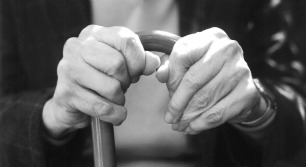Ode To A Surrogate Grandpa
I never knew what it was like to grow up with a grandfather. I had two tough as nails grandmothers, but they were both widows by the time I came around. My mother’s father died when she was still a child. Although my grandmother Tomasa would later remarry, her new husband Don Isaac died a short time after. My father’s father physically dropped dead while working the fields. As an adult, I never received much closure from my grandmother Josefina, because it goes against some unwritten commandment to speak about the dead.
So I found a surrogate grandfather in Don Beto. Don Beto lived with his wife Angie at the end of the neighborhood. They had been living there since the earth’s crust began to cool. He was a tall man, with a wisp of white hair on his head. Don Beto was a World War II veteran who had lost his sight during his service. He would never go further than that. Don Beto was the original issue. He was a strong yet soft spoken Chicano whose Spanish skills would bend but would not break.
Don Beto and Angie had been married since before he left to fight the war. They raised three Chicano stereotypes that were different from one another. Bob was the outlaw biker who was finding it hard to settle down and raise his family. He would always end up at his parent’s house when his old lady threw him out. Alex was the architect that was forever enrolled at UCLA. Then there was Magdalena who was a revolutionary artist. Their kids flew the nest at an early age. This opened up a space for me. I was unmolded clay they could work with, and best of all, I had a home to go to once the sun went down.
Don Beto would hit his cane up against the iron stairs at my house, which meant he wanted me to walk him to the newspaper stands, by the doughnut shop. I would hold on to his forearm and simply guide him and tell him when the light had gone from red to green. He would talk my ear off about the Dodgers or his warnings about Reagan and the Russians. He felt that would be the war I was destined to die in.
Don Beto’s family was in charge of my American assimilation. They actually celebrated things like Labor Day, Memorial Day, and the 4th of July – unlike my family who figured those were designated days for immigration officers to come down and arrest Mexicans waving flags. My mom usually spent those days peering through the curtains for green vans that never rolled up. Once in a while my family would throw their own cook-outs and Don Beto and his wife would join my father and the other neighbors with their recreational drinking. Don Beto would show up with a cap that featured two breasts wearing a bikini. When it came to drinking, Don Beto had a threshold. The only way you knew he was drunk was once the top came off his cap and the plush breasts were exposed.
In a way, I would love to remember Don Beto like that. The last time I saw him was years later when my family had already left the neighborhood. My family went to visit him and Angie, because a former neighbor told us that they were in bad shape. Sure enough, Angie was caught in the web of dementia. She did not recognize any of us, and Don Beto was disheartened because he felt he could be a better caretaker if he only had his eyes.
All I know is that Don Beto had a heart attack on a Friday. He died on a Sunday and was buried on a Tuesday. I wanted to go but so much time had passed, I do not think that I was officially invited by his family. His wife went to live with Bob and joined her husband a couple of years later. I do not even know where either one of my grandfathers are buried, but I would make a pilgrimage to Don Beto’s grave.
[Photo by duchesssa]

